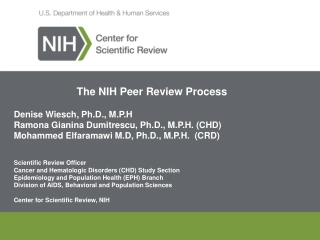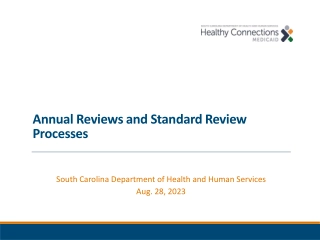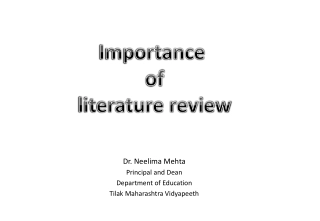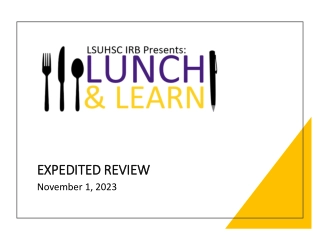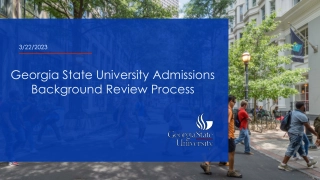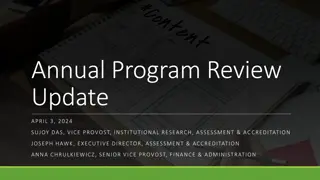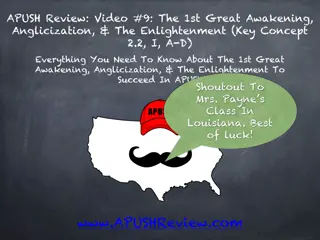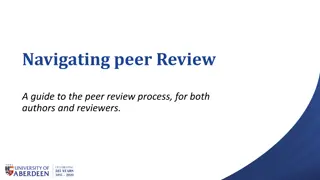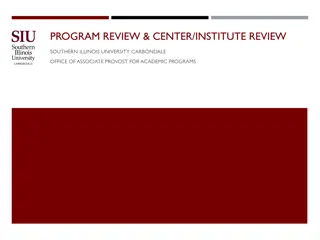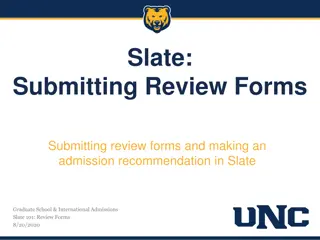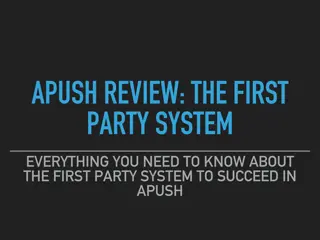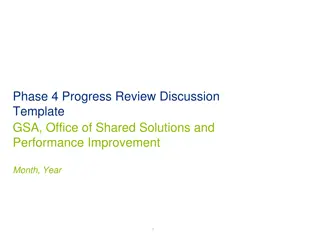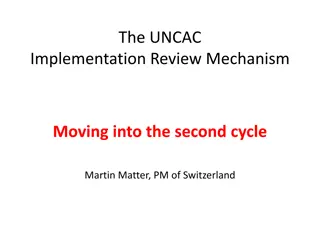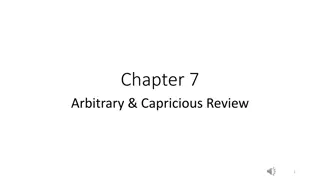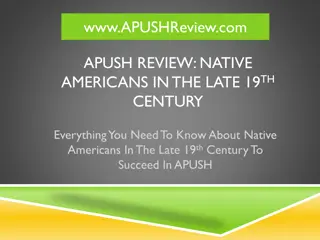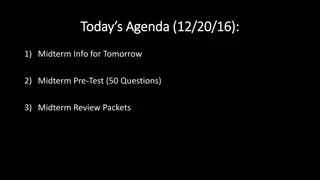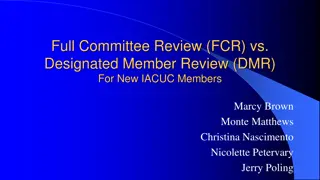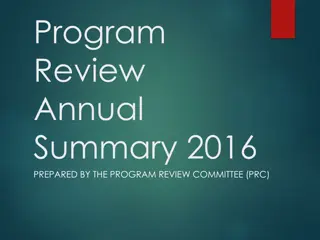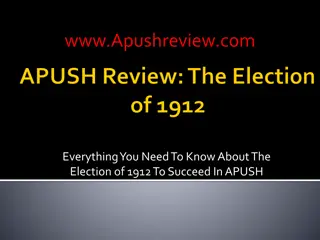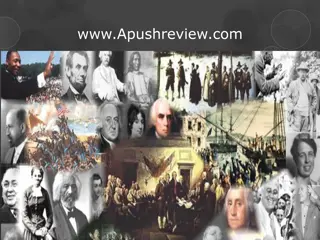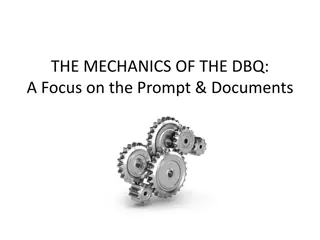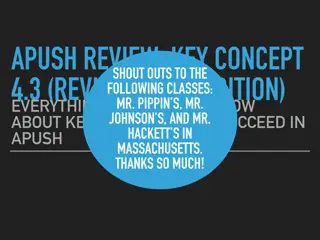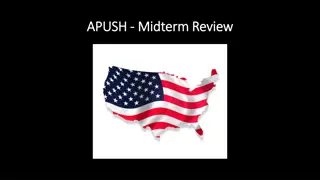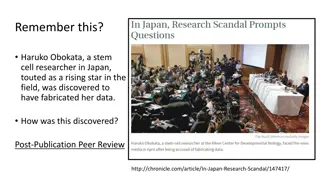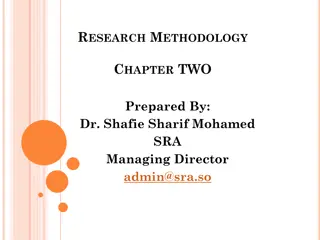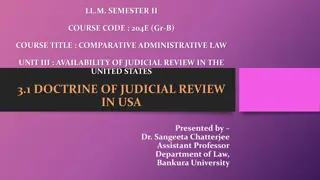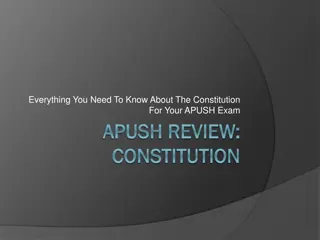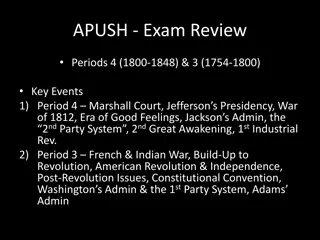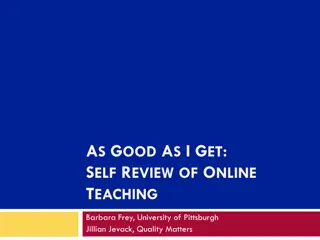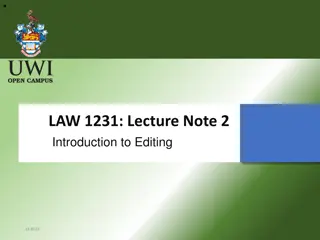The NIH Peer Review Process
The NIH Peer Review Process, including the role of the Center for Scientific Review (CSR) in receiving, referring, and reviewing grant applications. Understand how applications are assigned to institutes or centers and the importance of scientific and technical merit in the review process.
1 views • 18 slides
Annual Reviews and Standard Review Processes
The annual review and standard review processes implemented by the South Carolina Department of Health and Human Services. Stay informed about agency goals, PHE updates and activities, the annual review cycle, the 90-day grace period, and self-service tools available.
4 views • 11 slides
Simplified Review Framework
Simplified review framework for peer review criteria in research project grants, aimed at improving the evaluation process for peer reviewers. The framework will address concerns raised by the extramural community regarding increased complexity and administrative burden in NIH's peer review criteria
1 views • 20 slides
Importance of literature review
A literature review is a critical component of any research endeavor, providing a comprehensive analysis of existing knowledge in a particular field. This review helps in clarifying conceptual issues, understanding research design, persuading examiners, and contributing new insights to the subject a
0 views • 28 slides
Understanding IRB Review Process for Expedited Research
Learn about the significance of IRB review, levels of review, and categories of expedited review. Discover the criteria for IRB review, including whether the study involves human subjects and contributes to generalizable knowledge. Explore the different levels of IRB review and the specific categori
4 views • 11 slides
Georgia State University Admissions Background Review Process
Georgia State University conducts a comprehensive Admissions Background Review (ABR) process to assess applicants' admissibility based on reported information and potential threats to the campus. The ABR Committee evaluates responses to specific admissions background questions, referring cases invol
1 views • 11 slides
Understanding IRB Review Process for Research Studies
The content provides an overview of the IRB review process for research studies, including what necessitates IRB review, the levels of IRB review (exempt, expedited, full board), examples of full board research, and criteria for an Investigational New Drug.
1 views • 17 slides
Rapid Review of BSL Commissioning Arrangements by Dr. Michael Brady
NECS commissioned a Rapid Review of British Sign Language (BSL) service provision to identify areas for improvement in access and patient experience, especially during the Covid-19 pandemic. The review focused on stakeholder engagement, options appraisal for commissioning responsibility, and recomme
9 views • 19 slides
The Importance of a Managed Document Review Provider_ Why LDM Global is the Go-To Choice for Legal Services
In the complex world of legal proceedings, managing vast amounts of data efficiently and accurately is crucial. For law firms and legal departments, the process of document review can be both time-consuming and costly. This is where a managed document review provider, such as LDM Global, plays a piv
2 views • 15 slides
Enhancing Program Performance through Strategic Metrics Review
Explore the annual program review update process focusing on the importance of standardized program metrics, goals of the program performance review, tactical dashboard metrics, and detailed definitions for benchmarking. Learn how a strategic dashboard complements the review process for continuous i
0 views • 20 slides
The 1st Great Awakening, Anglicization, & The Enlightenment in APUSH
This content covers key concepts in APUSH related to the 1st Great Awakening, Anglicization, and the Enlightenment. It discusses the religious revival, emergence of new sects, Enlightenment ideas, Anglicization of the colonies, and Britain's mercantilism and imperial aims. The impacts on colonial so
0 views • 10 slides
Navigating Peer Review: A Comprehensive Guide for Authors and Reviewers
In academic publishing, peer review plays a crucial role in maintaining publication quality. This guide offers a detailed overview of the peer review process for both authors and reviewers, covering topics such as receiving review invitations, manuscript submission, writing effective reviews, and mo
0 views • 31 slides
Southern Illinois University Carbondale Office of Associate Provost for Academic Programs Review
The Program Review & Center/Institute Review at Southern Illinois University Carbondale aims to educate attendees on IBHE requirements, the review process, conflict of interest policies, self-study writing, on-site review involvement, financial support, and available resources. The IBHE mandates rev
0 views • 37 slides
Slate Graduate School & International Admissions Review Forms Overview
Explore the process of submitting review forms and making admission recommendations in Slate Graduate School & International Admissions, including automatic assignment of applications to queues, review of Staff Review Forms, and recommending admission or denial through Faculty Review Forms. Learn ab
0 views • 8 slides
Examining the First Party System in APUSH
Explore the political landscape of the 1790s with the formation of the first party system in APUSH. Discover the key positions on federal vs. state power, economic and foreign policies, and the delicate balance between liberty and order that gave rise to Federalists and Democratic-Republicans. Unfol
0 views • 11 slides
Phase 4 Progress Review Discussion Template Overview
This template guides a Progress Review discussion involving a Customer, Provider, and Key Stakeholders. It addresses the gaps in common business requirements, risk assessment confidence, deployment readiness, budget impacts, migration costs, and more. The template provides instructions for completin
0 views • 25 slides
Understanding Judicial Review in Administrative Law
In this chapter, the concept of judicial review in administrative law is explored, focusing on the scope of review set by Congress, including trial de novo and independent judgment on evidence. Different standards of review, such as clearly erroneous and substantial evidence, are discussed, highligh
0 views • 23 slides
UNCAC Implementation Review Mechanism: Moving Towards the Second Cycle
The UNCAC Implementation Review Mechanism is progressing into its second cycle, with a focus on evaluating challenges and terms of reference at the conclusion of each review cycle. The performance assessment has highlighted achievements in enhancing awareness and involvement of civil society/private
0 views • 7 slides
Understanding Arbitrary and Capricious Review in Administrative Law
Arbitrary and Capricious Review refers to a highly deferential standard applied to agency decisions, requiring agencies to demonstrate compliance with statutory requirements. The landmark case of Citizens to Preserve Overton Park v. Volpe set the precedent for a thorough judicial review based on the
0 views • 8 slides
Native Americans in the Late 19th Century: APUSH Review
Explore the systematic relocation, conflicts, and cultural assimilation of Native Americans during the late 19th century in America. From the Indian Removal Act to the Dawes Act, witness the impact of government policies on Native tribes, culminating in tragic events like the Sioux Wars and Wounded
0 views • 8 slides
Global Peer Review Activities and Future Plans Overview
This document highlights the recent peer review activities conducted by the Subcommittee on Peer Review, focusing on the accomplishments and upcoming plans for enhancing peer review processes. It includes insights from the Global Flyer Survey, training programs, and the development of guidelines, al
0 views • 3 slides
APUSH Midterm Review Agenda
The agenda for today includes important information and resources for the upcoming APUSH midterm. It covers topics from pre-Columbian history to the colonial period and provides study guides, practice tests, and recommended review materials. The focus is on preparing students for the exam with key c
0 views • 58 slides
Understanding Henry Clay's American System in APUSH Review
Dive into the significance of Henry Clay's American System in early 19th-century America, addressing challenges faced by infant industries and weak infrastructure. Explore the debate over the Bank of the United States (BUS) and the role of tariffs in fostering economic growth. Discover how these ini
0 views • 9 slides
Understanding Full Committee Review (FCR) vs. Designated Member Review (DMR) for New IACUC Members
Explore the differences between Full Committee Review (FCR) and Designated Member Review (DMR) for new IACUC members. Learn the acceptable methods of protocol review, federal requirements, member responsibilities, risks, and best practices for protocol approval. Dive into the two valid methods of IA
1 views • 23 slides
Program Review Annual Summary 2016 by PRC Committee
The Program Review Annual Summary 2016, prepared by the Program Review Committee (PRC), presents a detailed review of instructional programs and administrative units at the College. The report outlines the purpose of the annual review, the themes and issues identified, and recommendations for improv
0 views • 13 slides
Analyzing King Andrew I Political Cartoon in APUSH Review
In this document analysis, the negative portrayal of Andrew Jackson as a king standing on the Constitution is discussed along with the political parties that supported or opposed him. Historical examples supporting and opposing the depiction are explored, shedding light on Jackson's controversial pr
0 views • 6 slides
APUSH Review: World War I - Everything You Need to Know
Learn about the causes, key events, major players, and impact of World War I in this comprehensive review for APUSH success. Explore the two sides, US neutrality challenges, entry into the war, Wilson's 14 Points, and domestic issues during the conflict.
0 views • 12 slides
Election of 1912 and Its Impact on APUSH Students
Explore the dynamic Election of 1912 in US history, featuring William Howard Taft, Theodore Roosevelt, Woodrow Wilson, and Eugene Debs. Learn about the split in the Republican Party, Wilson's victory, Debs' Socialist impact, and the rise of the Progressive Party. Subscribe for more educational conte
0 views • 5 slides
Colonial Era Rebellions and Conflicts in APUSH Review
Explore significant rebellions like Bacon's Rebellion, Pueblo Revolt, Stono Rebellion, and Leisler's Rebellion in the Colonial Era. Learn about their causes, impacts, and historical significance to better understand the conflicts that shaped early American history.
0 views • 10 slides
Mastering the DBQ: Understanding the Prompt and Documents
Learn how to excel in the Document Based Question (DBQ) on the APUSH Exam by focusing on analyzing the prompt, handling task, limiting, and content words, and assessing the validity of historical statements. Explore the role of opposition forces in the defeat of the Treaty of Versailles, President W
0 views • 23 slides
APUSH Key Concept 4.3 Review: U.S. Foreign Policy and Expansion
The U.S.'s interest in foreign trade and expanding national borders influenced its foreign policy. Initiatives like the Monroe Doctrine and westward expansion led to conflicts over slavery, plantation slavery spread westward, and antislavery efforts increased in the North.
0 views • 8 slides
King Philip's War: A Comprehensive Review for APUSH Success
Explore the key concepts, events, and impacts of King Philip's War, also known as Metacom's War, a significant conflict between colonists and Native Americans in New England. Understand the causes, course of the war, effects on both sides, and its lasting significance in shaping European/colonial re
0 views • 9 slides
Native American Cultures and European Colonization in APUSH Midterm Review
Explore key differences among Native American tribes pre-Columbus, noting similarities in matrilineal societies and religious practices. Delve into the impacts of European arrival on environment, culture, identity, and politics of Native Americans from 1492-1607, contrasting English, Spanish, and Fr
0 views • 61 slides
Uncovering Fabricated Data in Stem Cell Research: The Haruko Obokata Scandal
Haruko Obokata, a promising stem cell researcher in Japan, faced allegations of data fabrication, leading to a significant research scandal. Post-publication peer review platforms like PubPeer, PubMed Commons, F1000 Research, and ResearchGate Open Review play vital roles in detecting and addressing
0 views • 11 slides
Effective Strategies for Conducting a Literature Review in Research Methodology
Understanding the importance of literature review in research methodology, this chapter discusses the objectives, aims, and guidelines for writing a comprehensive literature review. It emphasizes the significance of identifying gaps in existing knowledge, structuring the review, and organizing infor
0 views • 33 slides
Understanding the Doctrine of Judicial Review in the United States
Judicial Review is a crucial power of the judiciary to review the constitutionality of laws and executive orders. This article explores the origin of Judicial Review in the United States, focusing on the landmark case of Marbury v. Madison. It delves into the concept, importance, and application of
0 views • 14 slides
Understanding the Constitution for Your APUSH Exam: Key Points & Compromises
The Constitution was born out of the need to address the weaknesses of the Articles of Confederation. Key compromises like the Great Compromise and the 3/5 Compromise shaped its structure. Issues such as a weak central government and economic challenges were tackled through the ratification process.
0 views • 8 slides
APUSH Exam Review: Key Events in Periods 3 (1754-1800) & 4 (1800-1848)
Key events in Periods 3 and 4 of APUSH include the French & Indian War, American Revolution, Marshall Court decisions, Jefferson's presidency, War of 1812, 2nd Party System, and more. Explore the significant rulings, policies, and conflicts that shaped American history during these pivotal periods.
0 views • 48 slides
Enhancing Online Teaching Through Self-Review: Challenges and Benefits
Explore the self-review process of online teaching, including identifying challenges, benefits, and different types of reviews. Learn about developing an effective review guide, promoting collegiality, and facilitating professional development in online teaching. Discover the components of a review
0 views • 23 slides
Peer Review Process in Academic Editing
Explore the importance of peer review in academic and professional development, focusing on improving writing skills and critical evaluation. Learn about the benefits of peer review, ways to effectively review work, and various modes of assessment. Understand the peer review process and how it enhan
0 views • 29 slides
